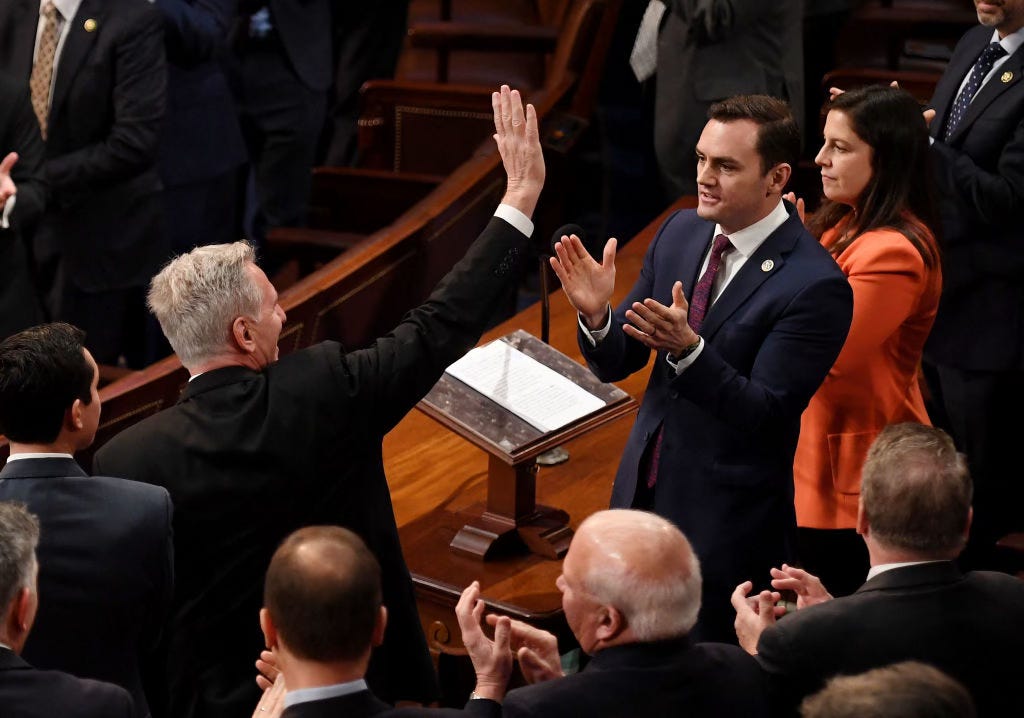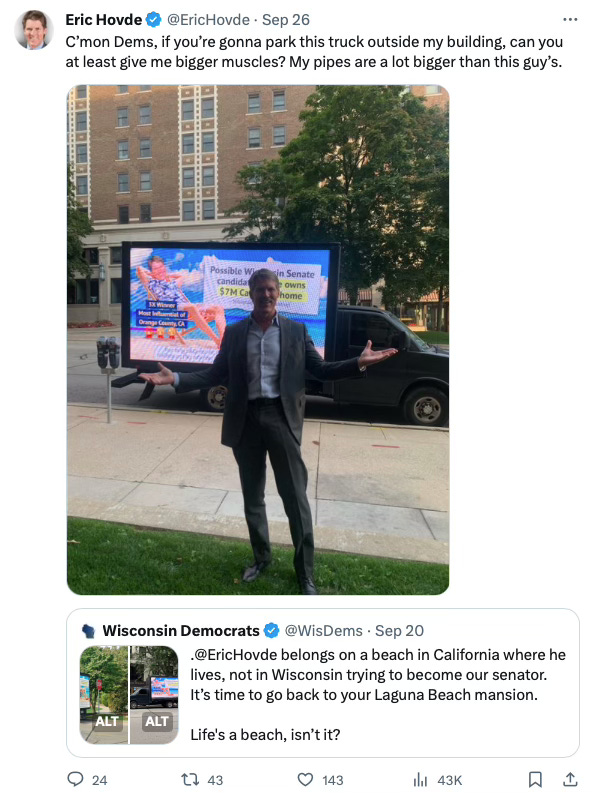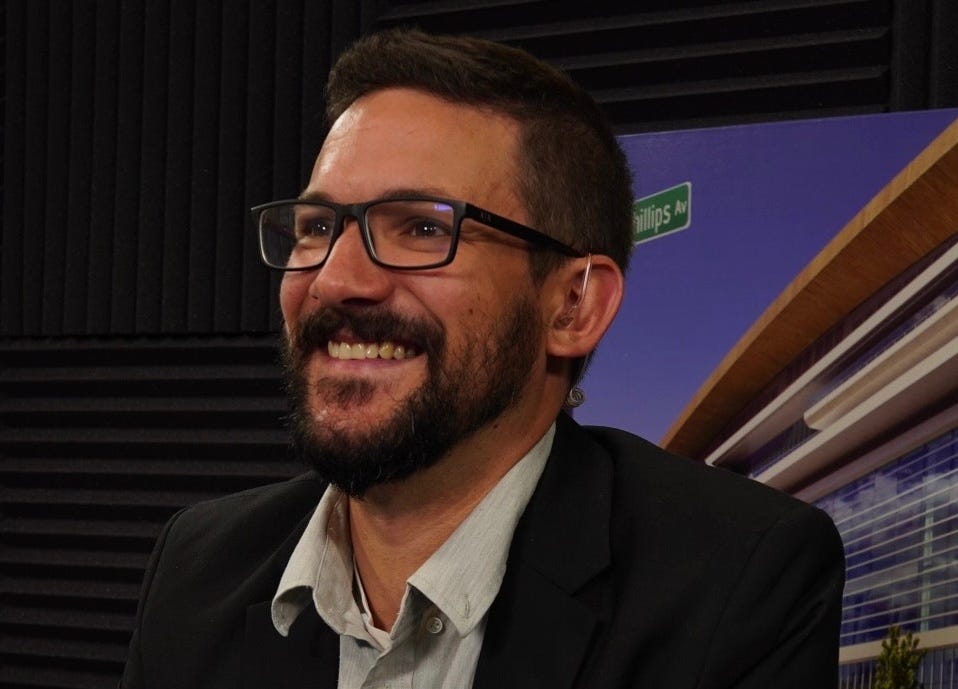Wisconsin Republicans still don’t have a serious candidate running for U.S. Senate
It's getting a bit strange that in this critically important swing state, no major GOP challenger has launched a campaign to run against Tammy Baldwin.
The Recombobulation Area is a ten-time Milwaukee Press Club award-winning weekly opinion column and online publication written, edited and published by longtime Milwaukee journalist Dan Shafer. Learn more about it here.

Sen. Tammy Baldwin announced this week that Wisconsin has landed a designation as a regional biohealth technology hub, which could bring up to $75 million in funding to the state through the CHIPS and Science Act. It was something she’d been pushing for for a while. A few weeks ago, she was in Milwaukee celebrating a new initiative of the Environmental Protection Agency that will bring a $275 million grant to clean up the city’s waterways. She also this week announced that Wisconsin was awarded more than $101 million to help lower energy costs, work done as part of her role as Chair of the Appropriations Subcommittee on Labor, Health and Human Services, Education, and Related Agencies.
These types of announcements are typical from Wisconsin’s junior senator, who always seems to be quietly busy bringing critical funding and key projects home to Wisconsin, something you rarely see from her senior senator counterpart. But as Baldwin stays busy in the Senate, she’s now just over one year away from facing the state’s voters once again, as she seeks re-election for a third term.
But a strange thing is happening in the race for U.S. Senate in Wisconsin. There’s still no major Republican candidate running against Baldwin.
As a new NBC News report on the race details, just about every other competitive Senate race in the nation, the race is on — but Wisconsin is an outlier. Candidates are well into their runs in Montana, West Virginia, Ohio, Michigan, Nevada and Pennsylvania — and declared candidates in Arizona and West Virginia await re-election decisions from Kyrsten Sinema and Joe Manchin, respectively — but thusfar, there have not been any significant challengers lining up to take on Baldwin in Wisconsin.
As it stands, Democrats hold the slimmest of majorities in the Senate, with a 51-49 edge. Next year’s election presents a real chance for Republicans to flip some seats and win a majority, as Democratic incumbents like Ohio’s Sherrod Brown and Montana’s Jon Tester will face tough reelection battles in states where Trump won twice. With a map this favorable to Republicans, many prognosticators have the odds in favor of the GOP winning a majority in the upper chamber.
Republicans’ path to flipping the Senate would become much more clear if they were able to flip a seat in a true swing state like Wisconsin, which would mean unseating Baldwin, but right now, the path to do that looks especially murky. Two relatively unknown candidates have declared, but a growing list of potential challengers has declined to run, a list that now includes congressmen Mike Gallagher, Tom Tiffany and Bryan Steil, as well as former lieutenant governor Rebecca Kleefisch. Wisconsin Republicans’ bench is not what it once was.

This is all unfolding very differently than the 2022 Senate race, where, by Oct. 2021, several Democrats had been campaigning for months in the race against Ron Johnson. Outagamie County Executive Tom Nelson even started his campaign in October 2020. Alex Lasry launched his campaign in Feb. 2021 and by October, he was running TV ads. Sarah Godlewski launched her campaign in April 2021, and eventual nominee Mandela Barnes officially announced his candidacy in July 2021.
Contrast to now, in Oct. 2023, where declared candidates currently include Stacey Klein, a county supervisor in Trempealeau County, and Rejani Raveendran, the chair of UW-Stevens Point College Republicans, neither of whom are considered serious contenders to win the primary.
So, who are the potential serious challengers? Two have emerged. They are: Eric Hovde and Scott Mayer. Neither would be particularly inspiring candidates.
Hovde was last seen on the statewide political stage when he ran for U.S. Senate more than a decade ago, coming in second in the Republican primary in 2012 behind former governor Tommy Thompson. Mayer has never before run for political office.
That means both potential candidates have spent the bulk of their career in the private sector. Mayer is the founder and board chair at Brookfield-based QPS Employment Group, a staffing and recruiting firm, and Hovde has been a top executive at several companies in real estate and finance. Many of his operations have been based out of Madison, but he also owns a home in Laguna Beach, California, a state where he also has some of his business operations (WisDems are already having some fun with this).
Being from the private sector is not the only thing these candidates have in common. For one, neither votes all that frequently. Daniel Bice of the Milwaukee Journal Sentinel reported that Hovde has missed voting in 17 of the last 30 elections in Wisconsin, and Bice also reported that Mayer did not vote in the 2020 presidential primary and general elections, saying, “I didn’t vote, and I couldn’t even recall that I didn’t. I don’t know why. I mean, I don’t have a good reason.” Even right-wing talk radio host and columnist Mark Belling recently said they should be removed from the voter rolls over their infrequent voting habits.
What Hovde and Mayer also have in common — and what might be the only reason neither candidate is yet running — is that they each have significant personal wealth, which they’ve said they would use to self-fund their campaigns. Mayer said, per WisPolitics, that he would have to spend $10 million to $20 million of his own money to launch the campaign. Hovde went even further, floating that he could spend at least $20 million of his own money.
From the quasi-carpetbagging to the lack of political experience to the eight-figure self-funding, the comparisons to failed Republican gubernatorial candidate Tim Michels write themselves.
Something with the Michels campaign Republicans appear to be looking to learn from, as the NBC News report details, is another contentious primary. The Michels-Kleefisch primary, as well as the nonpartisan-in-name-only primary for Wisconsin Supreme Court — where Daniel Kelly advanced to the general and Jennifer Dorow came up short — both left Republicans reeling going into the general election, playing a part in eventual victories for Democrat Tony Evers and liberal justice Janet Protasiewicz. Ron Johnson was even quoted as saying, “I would hope that they would have those conversations and decide amongst themselves. Instead of having a nasty primary, let’s back one of us and move forward.”
Belling, however, suggested in a September column — one with the headline “Another GOP civil war?” — that Wisconsin Republicans’ intraparty divide could materialize again in this primary, with “yet another battle between the two warring GOP wings.” Those wings, he details, would be the Walker/Kleefisch camp, which backs Mayer, and the “everybody else” wing, which includes Tommy Thompson and a “weird coalition of Trump-backing outsiders and Madison insiders from the lobbying crowd.”
In that column, Belling also addresses another elephant in the room for this race — David Clarke, the controversial former Milwaukee County sheriff who resigned after mounting scandals in 2017, and has been flirting with a potential Senate run. Clarke might have the edge over the field on name recognition, but Belling wrote in the column, “I don’t think Clarke will run.” Since Clarke has frequently been a fill-in host for Belling — including a post-2020 election appearance where Clarke had (now-convicted) former Proud Boys leader Enrique Tarrio on as a guest — these remarks from the News/Talk 1130 afternoon host are indeed noteworthy.
Other potential Republican candidates who have been mentioned include former state senator Roger Roth of Appleton, who most recently was the lieutenant governor candidate running alongside Michels, and perennial candidate Kevin Nicholson, who lost in the primary for Senate in 2018 and abandoned a bid for governor in 2022. Neither are going to move the needle significantly.
So if it’s going to be Hovde vs. Mayer, and if that primary projects to be as contentious as Michels/Kleefisch and Kelly/Dorow, that could really boost Baldwin’s odds of winning re-election.
Wisconsin is as much of a 50-50 swing state as it gets, so any statewide race projects to be close, especially in a presidential election year. While she won by double-digits in a Democratic wave year in 2018, a Baldwin win in 2024 is far from a sure thing. This is Wisconsin, after all. But her odds have to have improved over the past few months, she continues to post strong fundraising numbers, and her outlook going into 2024 probably makes this more of a “Lean D” race than the typical Wisconsin “Toss-up.” Baldwin has to, at this point, be considered the clear favorite to win re-election in 2024.
Ron Johnson was the favorite all along to win his race, too, and he didn’t announce re-election until January of 2022, so perhaps Hovde and Mayer are following his lead in taking this type of delayed approach to the campaign. Fundraising clearly isn’t as important for millionaire self-funders as it might be for other candidates. Hovde sure seems headed for an announcement, though, especially after he sold millions of dollars worth of stocks, a definite sign of a pending campaign.
There is time, though. This primary doesn’t happen until Aug. 13, 2024, which, in an odd quirk of the political calendar, happens to be taking place after the Republican National Convention will be held in Milwaukee (July 15-18). Whatever is happening at that time with the Republican presidential nominee — very likely to be Donald Trump — could play a significant part in this primary, too.
Still, it’s bizarre that no major Republican candidate has yet to launch a campaign for Senate. Perhaps Tammy Baldwin is just that strong of an incumbent, and more serious contenders are waiting to take their shot at a Senate run in a different election cycle.
But this is something that could have an impact on races across the state. An underwhelming Senate candidate and/or a party in disarray could be something that could reverberate throughout the 2024 ballot, from the presidential race at the top of the ticket on down to the state legislative races — ones that could be happening under new maps.
And in the meantime, Baldwin will undoubtedly continue to do the quiet, competent work of governing, putting herself on a path to serve for another six years in the U.S. Senate.
Dan Shafer is a journalist from Milwaukee who writes and publishes The Recombobulation Area. He’s also written for The New York Times, The Daily Beast, Heartland Signal, Belt Magazine, WisPolitics, and Milwaukee Record. He previously worked at Seattle Magazine, Seattle Business Magazine, the Milwaukee Business Journal, Milwaukee Magazine, and BizTimes Milwaukee. He’s won 17 Milwaukee Press Club Excellence in Journalism Awards. He’s on Twitter at @DanRShafer.
Subscribe to The Recombobulation newsletter here and follow us on Facebook and Instagram at @therecombobulationarea.
Already subscribe? Get a gift subscription for a friend!
Follow Dan Shafer on Twitter at @DanRShafer.
#BucksInSix




